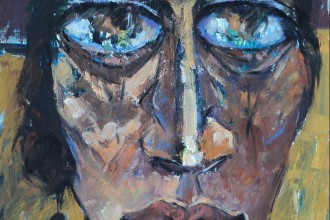I
A year later I am having bouts of suicidal compulsions and frequent panic attacks both of which I decide occur because I take my antidepressants with the opioids. So of course I give up the happy pills. Because obviously being high is so much better and more effective. My five accidental overdoses? Totally my fault, but they were an essential lesson for me to discover my limits. This is really completely logical in my head.
It’s when the seizures start that I decide maybe I was being a wee bit reckless. By that I don’t mean—God forbid—I was worried about my own life; rather I was worried about my parents discovering the hidden half of my life.
Then smack!
How can I do justice to the magic of heroin? It’s free of that edge of detachment opioids had. No severe nausea. No days of forgetting to eat till you’re turning blue. No bad highs. No panic. Just a pure shot of animating life into my decomposing soul. Fairy dust. Ravishing daze. Sublime trance. Mundane turns magical. Euphoria sprouts like cancer, extends its flagella through every axon, courses through dendrites. My protoplasm quivers in anticipation of life’s forthcoming grandeur. My chrysalis lies in a torn heap on my bedroom floor. I am Prometheus unbound…
I love the heroin. No, I worship it. I adore it with the blind passion Apollo must have felt for Cassandra or Hades for Persephone. It should come as no surprise, then, that I fail to realize it was slowly making me stark-raving mad. More than even alcohol did. As in a bat-shit, mad hatter, mental institution type of nuttiness.
But I’m getting ahead of myself again.
J
Enter Mohamed, though everyone calls him Hamada. Picture a disturbingly skinny, short 40-something-year-old man with a squeaky voice, bug eyes and yellow teeth. He works as a school driver for kids of varying ages and has twelve years of work experience as a taxi driver. Hamada’s personality—much like his life—is an intense avalanche of kinetic energy heading nowhere. He has a high manic laugh which erupts as suddenly as his temper tantrums, carries numerous almost-empty packs of cigarettes, has seemingly endless anecdotes of dealings with prostitutes and often tunes in to English music stations on his radio, fervently singing along in a horrible accent which fails to distinguish between the letters B and P.
To explain to you the use of Hamada in my life, Ekleel, you have to first know that I’ve never encountered a dealer who worked in a reputable area. They either operate out of dumps at the hearts of the ghetto or on desert roads just outside the circumference of Cairo; basically, spots where the occasional corpse of a junkie can be easily disposed of. Originally, the greater majority of dealers in Cairo hail from the Sinai desert, where “woman” can be roughly defined as: a) housewife, b) obedient, c) creature in a tent-like black cloak and a black headscarf, d) property of father, then property of husband. For those reasons, any city girl in tight jeans out on deserted highways to buy heroin essentially amounts to rape-worthy whore, in their opinions.
So Hamada, in his beat-up blue car, and I drove all over the city, him blowing what’s left of his inheritance and I spending the ridiculous sums of money I made. For a while, everything seemed too good to be true. Morning—around 7 am—Hamada would pick me up and we’d drive out to some hovel or spot on the road which leads from Cairo to Fayoum where dealers dressed little better than the homeless sit in giant black jeeps, surrounded by their minions who kept their guns pointed at Hamada, at the car window behind which I sat, during the entire transaction. We’d leave quickly and find some secluded spot to park and take that first heavenly hit of the day. He’d then drop me off to work. I’d spend my entire seven-hour shift writing, editing, translating articles at an inhuman speed, taking only small breaks to smoke and text Ramy. He’d come ’round to pick me up from work and we’d spend the evenings high as kites, cruising down dark streets where we’d make out or he’d listen to me chat endlessly.




